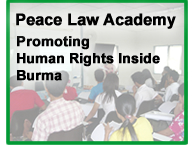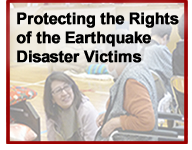7 September 2009
Dear Minister for Foreign Affairs Hirofumi Nakasone,
The intent of the statement
We
request the Japanese government to take every effective measure for the
extension of the mandate of Mr. Surya Prasad Subedi, the Special
Rapporteur of the UN Human Rights Council for Human Rights in
The background and reasons for the request
1. The Special Rapporteur system and current status
Cambodia has committed
serious violations of human rights including the massacres of the
1970's. Since UN Human Rights Council was the UN Commission on Human
Rights, the United Nations has been monitoring human rights in
Mr,
Yash Ghai, the Special Rapporteur from 2005 to 2008, took various
approaches, including active criticism of the Cambodian government's
violation of human rights. However, the relationship between the
Cambodian government and Mr. Ghai was aggravated by some of his
aggressive approaches. Last year, Surya Prasad Subedi was elected to be
the new Special Rapporteur to engage in a constructive manner for one
year1.
The UN Human Rights Council will decide whether to extend
his mandate at its twelfth session in September. However, the extension
of his mandate cannot be expected.
Human Rights Now, an international human rights NGO based in
2. Serious concern for the human rights situation in
Since
the Paris Agreement, Cambodian politics and economics have been
relatively stable. However, Cambodians face other disturbing violations
of human rights, such as the suppression of human rights activists'
freedom of expression, and attacks on them, some of which have resulted
in death.
As the economic gap widens, human rights violations
against the poor, including forced evictions and human trafficking, are
rapidly increasing.
In 2006, with the Japanese government's
support, "Extraordinary Chambers in the Courts of Cambodia" was created
to try cases of human rights abuse in
The special court is currently entering
crucial stages to carry out fair punishments for past human rights
abuses and to prevent recurrence of further human rights abuses.
Cambodian
Prime Minister Hun Sen has made negative remarks concerning additional
prosecutions in the special court, which remains at risk for political
influence.
3. Violation of freedom of expression, democracy, and judicial independence
(1)
In recent years, criminal defamation cases which government officials
file concerning political voices and actions of politicians, human
rights activists, journalists, and other government critics, have been
increasing. Government officials have also sued many Diet members for
defamation.
Five prominent human rights activists were arrested on
charges of defamation with their banner displayed at a rally to mark
Human Rights Day in December, 2005. The arrest led to international
criticism because of the obvious suppression of free speech.
(2) This year, freedoms of speech and expression have been more seriously compromised.
Mu
Sochua, the opposition Sam Rainsy Party (SRP)'s member of the Cambodian
parliament, sued Prime Minister Hun Sen for defamation2. Hun Sen was
accused of insulting Mu Sochua's honor in a speech he made during a
visit to her district Kampot on April 4th.
Hun Sen countersued
Mu Sochua for defamation, accusing her of insulting his honor with the
complaint. On June 6th, the Phnom Penh Municipal Court dismissed her
lawsuit against Hun Sen, claiming that no defamation occurred, while
Hun Sen's counter-suit which his lawyer Ky Tech filed against her
proceeded. On June 22th, 2009, the National Assembly stripped Mu Sochua
of her parliamentary immunity.
The Phnom Penh Municipal Court ruled that Mu Sochua was guilty of defaming Hun Sen and ordered her to pay a fine of US$4,1003.
Since
the lawsuit against Mu Sochua, ruling party officials have filed
lawsuits against SRP's party leader Sam Rainsy, SRP member Ho Vann; and
a journalist of a SRP-affiliated newspaper Heng Chakra. SRP member
Cheam Channy was convicted in a trial in 2005, after his parliamentary
immunity was revoked. Ruling-party officials' accusations and
prosecution for defamation against opposition members weaken free
discussions about public matters. They also threaten all citizens'
freedom of expression and democracy.
(3) The Cambodian
government and its officials should respond to criticism and commentary
from society. They should not suppress and intimidate criticism with
criminal punishment. The guarantee of free speech and political
behavior is the main premise of democracy. Investigation and criminal
prosecution of Diet members and citizens having different views from
the government for defaming ruling-party and administration officials
as individuals do not make sense.
It is unfair that legal
judgment on Prime Minister Hun Sen was the complete opposite of the
judgment on Mu Chua, even though both which were defamation lawsuits.
It became clear that the courts are still not independent in
implementing judicial procedures.
4. Conclusion
As stated above, the worsening human rights situation in
The UN special procedures should be
continued in order not to undermine the efforts exerted by UN,
governments, and donors for improvement of Cambodian human rights
situation. The one-year term is too short for Surya Prasad Subedi to
create results with a "constructive" way in his assignment
UN
special procedures in Cambodia were undertaken with agreement of the
Cambodian government, so the intentions and understanding from the
government are strongly needed.
The Special Rapporteur's mandate should be extended to
provide time for him to better acquaint himself with the human rights
situation in







